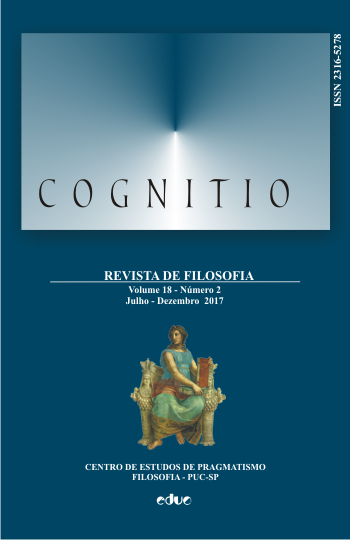What a practical philosophical point of view can or cannot be
DOI:
https://doi.org/10.23925/2316-5278.2017v18i2p273-312Keywords:
Practical-poietic materialism, Reflexive-analytic skepticism, “Human” knowledge vs “animal” know-how, Dialectics, Circularity, Justification.Abstract
The text comprises two opposing parts. In the first, shorter, one, from a skeptic-analytic position, Waldomiro raises a set of critiques and questions on Crisóstomo’s practical-poietic position that, in the second part, endeavors to answer each one of them. The first position, internalist, considers the notion of reflection as key; the second, externalist, focuses on the notion of practice (sensitive). As to the former, philosophy must address only isolated problems that hinder the flow of practical life. As to the latter, also from the point of view of practical life, philosophy can legitimately be concerned with the general understanding of things, a guide, being neither dogmatic nor transcendental. In the development of his viewpoint, Crisóstomo relies on his notion of sensitive intentionality and our so-called practical-sensitive and creative entanglement with the world and things. A point of view, therefore, intended to be practical, non-ascetic, favorable to creation, that develops and is established through confrontation with empiricism, while passive, abstract, mentalist, dogmatic, as well as with language-centrism, as idealist, relativist, “agnostic.” Waldomiro approves this position, but views its scope, its form of dialectic justification (that would involve circularity), its apparent reduction of human knowledge and know-how, and occasional inconsistencies of a contradictory creative naturalism as possibly over-ambitious (logo, dogmatic, transcendental). To Crisóstomo, on the other hand, it is Waldomiro’s point of view that risks involving subjectivism, artificialism and inconsistency in support of our beliefs.Downloads
Published
2018-02-03
How to Cite
Silva Filho, W. J., & Souza, J. C. de. (2018). What a practical philosophical point of view can or cannot be. Cognitio: Revista De Filosofia, 18(2), 273–312. https://doi.org/10.23925/2316-5278.2017v18i2p273-312
Issue
Section
Cognitio Papers









